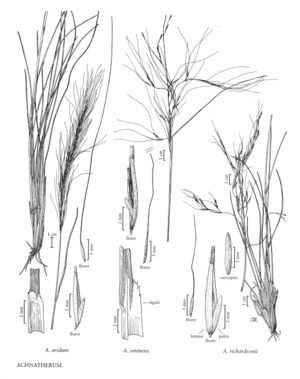Difference between revisions of "Achnatherum aridum"
FNA>Volume Importer |
FNA>Volume Importer |
||
| Line 7: | Line 7: | ||
|synonyms={{Treatment/ID/Synonym | |synonyms={{Treatment/ID/Synonym | ||
|name=Stipa arida | |name=Stipa arida | ||
| − | |authority= | + | |authority= |
| + | |rank=species | ||
}} | }} | ||
|hierarchy=Poaceae;Poaceae subfam. Pooideae;Poaceae tribe Stipeae;Achnatherum;Achnatherum aridum | |hierarchy=Poaceae;Poaceae subfam. Pooideae;Poaceae tribe Stipeae;Achnatherum;Achnatherum aridum | ||
| Line 20: | Line 21: | ||
-->{{Treatment/Body | -->{{Treatment/Body | ||
|distribution=Colo.;N.Mex.;Tex.;Utah;Calif.;Ariz.;Nev. | |distribution=Colo.;N.Mex.;Tex.;Utah;Calif.;Ariz.;Nev. | ||
| − | |discussion=<p>Achnatherum aridum grows on rocky outcrops, in shrub-steppe and pinyon-juniper associations, from southeastern California to Colorado and New Mexico, at 1200-2000 m. It has also been reported from Texas, but no specimens documenting these reports have been located. It has not been found in Mexico.</p> | + | |discussion=<p><i>Achnatherum aridum</i> grows on rocky outcrops, in shrub-steppe and pinyon-juniper associations, from southeastern California to Colorado and New Mexico, at 1200-2000 m. It has also been reported from Texas, but no specimens documenting these reports have been located. It has not been found in Mexico.</p> |
|tables= | |tables= | ||
|references= | |references= | ||
| Line 29: | Line 30: | ||
-->{{#Taxon: | -->{{#Taxon: | ||
name=Achnatherum aridum | name=Achnatherum aridum | ||
| − | |||
|authority=(M.E. Jones) Barkworth | |authority=(M.E. Jones) Barkworth | ||
|rank=species | |rank=species | ||
| Line 37: | Line 37: | ||
|family=Poaceae | |family=Poaceae | ||
|illustrator=Cindy Roché | |illustrator=Cindy Roché | ||
| + | |illustration copyright=Utah State University | ||
|distribution=Colo.;N.Mex.;Tex.;Utah;Calif.;Ariz.;Nev. | |distribution=Colo.;N.Mex.;Tex.;Utah;Calif.;Ariz.;Nev. | ||
|reference=None | |reference=None | ||
| Line 42: | Line 43: | ||
|publication year= | |publication year= | ||
|special status= | |special status= | ||
| − | |source xml=https:// | + | |source xml=https://jpend@bitbucket.org/aafc-mbb/fna-data-curation.git/src/f50eec43f223ca0e34566be0b046453a0960e173/coarse_grained_fna_xml/V24/V24_176.xml |
|subfamily=Poaceae subfam. Pooideae | |subfamily=Poaceae subfam. Pooideae | ||
|tribe=Poaceae tribe Stipeae | |tribe=Poaceae tribe Stipeae | ||
Revision as of 20:18, 16 December 2019
Plants cespitose, not rhizomatous. Culms 35-85 cm tall, 0.9-2.5 mm thick, usually glabrous and smooth, sometimes scabridulous or puberulent; nodes 2-3. Basal sheaths glabrous, upper sheath margins hyaline distally; collars of the basal sheaths occasionally with a small tuft of 0.8 mm hair on the sides, collars of the upper leaves glabrous, scabridulous, or sparsely puberulent; ligules 0.2-1.5 mm, truncate to rounded, erose, sometimes ciliate, cilia about 0.05 mm; blades 0.9-3 mm wide, abaxial surfaces smooth or scabridulous, glabrous, adaxial surfaces hirtellous, hairs to 0.5 mm. Panicles 5-17 cm long, 1-1.5 cm wide, contracted, bases often enclosed at anthesis; branches appressed or strongly ascending, straight, lower branches 1.5-4 cm. Lower glumes 8-15 mm long, 0.6-0.8 mm wide; upper glumes 1-5 mm shorter; florets 4-6.5 mm long, 0.6-1.1 mm thick, fusiform, terete; calluses 0.2-1 mm, sharp; lemmas evenly hairy on the lower portion, hairs 0.2-0.5 mm, the distal 1/5 – 1/4 often glabrous, apical hairs absent or fewer than 5, to 1.5 mm; awns 40-80 mm, persistent, obscurely once-geniculate, scabridulous, terminal segment flexuous; paleas 2-3.2 mm, 1/2 - 3/4 as long as the lemmas, pubescent, hairs exceeding the apices, apices rounded, flat; anthers 2-3.5 mm, dehiscent, not penicillate. 2n = unknown.
Distribution
Colo., N.Mex., Tex., Utah, Calif., Ariz., Nev.
Discussion
Achnatherum aridum grows on rocky outcrops, in shrub-steppe and pinyon-juniper associations, from southeastern California to Colorado and New Mexico, at 1200-2000 m. It has also been reported from Texas, but no specimens documenting these reports have been located. It has not been found in Mexico.
Selected References
None.
